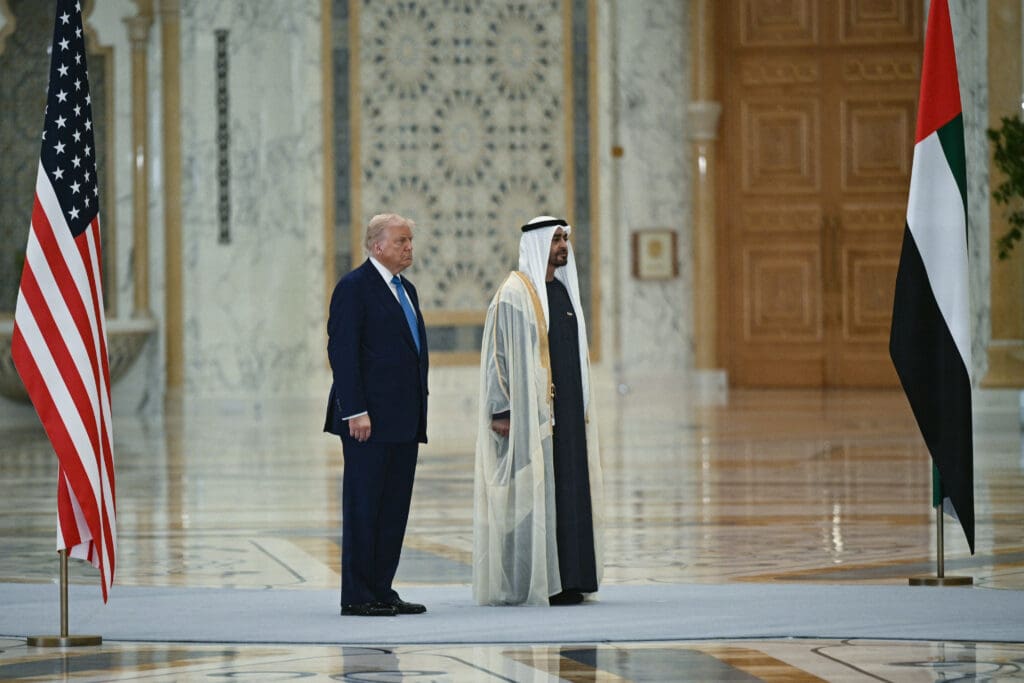When U.S. President Donald Trump visited the Gulf last month, complete with fanfare and choreographed spectacle, it reinforced a growing sense among Gulf states that the region is on a political ascent. The four-day tour of Saudi Arabia, Qatar and the United Arab Emirates was Trump’s first major foreign trip in his second term—a deliberate decision to bypass traditional U.S. allies, including Israel—and Gulf officials and academics increasingly view themselves as part of a rising bloc with significant leverage.
The assumption, evident in the Abraham Accords, that access to the United States was best secured via Israel seemed to be giving way to a new confidence that the Gulf can deal directly with Washington, and be heard on its own terms. As former Emirati Minister of State for Foreign Affairs Anwar Gargash recently put it, the balance of power is seen to be tilting in the Gulf’s favor.
Whether these assumptions reflect reality or are grounded in any tangible and lasting shifts in the international order remains to be seen. Indeed, Trump’s decision to join Israel in attacking Iran—and Iran’s retaliatory strikes against the Al Udeid military base in Qatar—sounded alarm bells in Gulf capitals, and leaders are now trying to ensure that the fragile ceasefire holds.
The Iran-Israel crisis has presented deep and potentially existential risks for Gulf states. But it has also offered critical opportunities to try to increase their leverage with Washington, position themselves as regional intermediaries, and to be seen—in stark contrast to Israel—as the responsible adults in the room. “It’s still the Gulf’s moment,” one prominent Emirati professor argued after the ceasefire was reached, “and it’s here for years to come.”
Nowhere is this desire more evident than in the UAE, which has long asserted itself as a step ahead of its neighbors. The UAE is referred to by some in the West as “Little Sparta,” a moniker that once captured its military buildup, regional interventions and strategic ambitions. It was a label that spoke to the country’s growing martial prowess and readiness to project force, including in support of U.S. interests. But if the UAE was once content to be seen through that lens, it no longer wants to be confined by it.
Today, Abu Dhabi envisions a far more sophisticated role for itself—one that is not dictated by external perceptions or interests, but by its own strategic calculus to pursue an independent agenda that reflects its security priorities and global ambitions for influence. In this new paradigm, the UAE frames itself as a rational, dependable alternative to Israel: a state it can partner with, learn from, and perhaps even siphon talent and expertise from to help build its own seat of empire at home.
In a series of posts on X/Twitter, Emirati analyst Mohammed Baharoon recently warned that Israel risks becoming the region’s principal source of instability, likening its posture to that of the mythical character Thor, whose worth comes only from his hammer. The region, he argued, has no appetite for godlike actors wielding blunt force, but needs reliable actors who are capable of building economic partnerships and prioritizing them over security alliances. Implicit in these posts is the UAE’s quiet self-promotion as the rational, steady alternative to Israel—for both regional and international actors alike.
A new regional linchpin
For the UAE, the Gaza war and Israel’s growing global isolation has presented a strategic opportunity to strengthen this image. But the groundwork for this opportunity was laid much earlier, during the 2021 crisis in the Jerusalem neighborhood of Sheikh Jarrah, where Israel’s attempts to displace Palestinian residents sparked international outcry.
The surge of global criticism of Israel’s actions—which came on the heels of a landmark Human Rights Watch report accusing Israel of apartheid—coupled with a newfound willingness by Western media to platform Palestinian voices that challenge the Israeli narrative, signaled a potential shift that could quickly gather momentum. The backlash to Israel was not confined to the Arab world, but resonated globally—prompting the UAE to ease its heavy-handed restrictions on public criticism of Israel, which was untenable in the immediate aftermath of normalization.
Attuned to these shifting currents both domestically and internationally, the UAE began to envision a new role for itself as a regional linchpin.
Politically stable, economically prosperous, and projecting an image of social tolerance, the UAE has carefully cultivated its profile as an emerging middle power—one that, unlike Israel, is self-sufficient and independent of foreign aid. The UAE sees itself as a successful model of non-democratic coexistence, unburdened by perpetual internal conflicts and largely impervious to hostilities from neighboring states. And having spent decades systematically suppressing Islamist activism both at home and abroad, the UAE can position itself as a dependable Western ally, a model of “secular autocracy.”
While the UAE continues to act as a bulwark against Islamism, it has been largely comfortable engaging with religious fundamentalism elsewhere, whether by deepening ties with Israel’s current right-wing government, warming relations with India’s Hindu nationalist leadership or coddling U.S. evangelical networks. To Abu Dhabi, such fundamentalisms can be rationalized, tolerated or even partnered with because they pose no real threat to its domestic legitimacy or regional ambitions.
In particular, the UAE sees India’s rise, with its distinct civilizational identity, as evidence that religious nationalism can coexist with international respectability. The common denominator, however, is hard power—nuclear capability, economic heft and strategic indispensability—a currency that the UAE seeks to acquire. But unlike India, the UAE has been actively cultivating a national identity that showcases a cultural heritage deliberately untethered from religion, in part to dispel the persistent refrain that it and its Gulf neighbors lack historical depth, authentic culture or civilizational roots.
One telling example unfolded during President Trump’s visit to the UAE, when he and UAE President Mohamed bin Zayed (MBZ) walked between two opposing rows of sword-wielding, male Ayyala dancers, flanked by troupes of young female dancers known as Na’ashaat. While the spectacle drew a flurry of puzzled comments internationally, the choreography was calculated: The UAE was not only asserting its cultural heritage, but by foregrounding female performers in a highly public setting, it also conveyed an image of liberalism to international audiences.
Embedded in this display was a deeper layer of defiance. During the bitter rift between Qatar and the UAE from 2017 to 2021, when diplomatic spats descended into vulgar insults aimed at the mothers of each emirate’s ruling heads, Abu Dhabi’s ruling family became the target of a particularly pointed epithet: “the children of the Na’asha.” Intended as an insult to MBZ’s mother, Sheikha Fatima, who is said to have once been a young Na’asha before catching the eye of Sheikh Zayed, the phrase still lingers on Gulf social media.
Against this backdrop, the public display of the Na’ashaat during a high-profile state ceremony was not merely cultural pageantry but an act of reclamation, transforming a weaponized reference into an assertion of national pride.
Filling a geopolitical vacuum
Beyond the cultural rebranding, the UAE has been equally adept at showcasing its wealth, stability, and global connectivity. From government officials’ frequent announcements of new partnerships with Silicon Valley executives, to the steady drumbeat of headlines in local and international media hailing the UAE as a magnet for global capital and elite migration, the message is clear: In a volatile Middle East, the UAE wants to be seen as a sanctuary of stability.
With Israel mired in a prolonged war in Gaza and an expanding war in Iran, in addition to diplomatic crises and mounting economic strain, the UAE sees a strategic opening. Abu Dhabi is in place to absorb the anticipated exodus of capital and talent as investors and businesses seek out more stable ground.
The UAE is also strengthening its footprint in sectors traditionally dominated by Israel, including technology, defense and diplomacy. A case in point is Abu Dhabi’s announcement during Trump’s visit of plans to build the largest cluster of artificial intelligence data centers outside the United States, cementing its position as a regional tech hub.
But the UAE isn’t just competing in tech. The disruption of maritime traffic in the Red Sea by the Houthis also afforded it an opportunity to assert itself as a vital node in an emerging, albeit aspirational, regional logistics network. In response to the attacks on shipping, Abu Dhabi launched an initiative to establish a land bridge designed to circumvent Houthi interference and facilitate the overland transportation of goods to Israel via the UAE and Saudi Arabia.
Framed as a strategic contingency, this project also serves as a prototype for a broader, long-term ambition: the development of a trans-regional trade corridor connecting India to Europe through the Middle East, with the UAE poised to occupy a central role. Advancing this vision, Abu Dhabi recently signed an $800 million Memorandum of Understanding to develop Syria’s port of Tartous. It’s the kind of deal that Israel itself, given its belligerence toward Syria and much of the region, could likely never have secured.
But the UAE’s Spartan ambitions are informed by Israel’s extensive and multifaceted military footprint, both within and outside of the region. The ongoing genocide in Gaza has created a useful distraction, enabling the UAE to deepen its military engagements and interventions, particularly in Africa, with Sudan becoming a key theatre of military power and influence.
By leveraging the diplomatic capital afforded by the Abraham Accords, the UAE has been able to preempt criticism and deflect scrutiny over its military involvement in Sudan and other conflicts in Africa. In doing so, it perceives itself as occupying a position of relative impunity, akin to that historically enjoyed by Israel due to its alignment with Western security interests. Unlike Israel, however, the UAE has thus far managed to evade comparable international censure, maintaining an image of pragmatism and stability, despite its own sub-imperialist interventions in conflicts such as those in Sudan, Yemen and Libya.
A case in point is the International Court of Justice’s (ICJ) recent dismissal of Sudan’s case accusing the UAE of complicity in genocide for its role in arming and funding paramilitary forces, citing a lack of jurisdiction. The UAE celebrated the decision as a significant victory and a testament to its soft power, rather than a dismissal based on a technicality. And while Israel faces persistent accusations of testing weapons and intrusive surveillance technologies on Palestinians under occupation, Abu Dhabi instead markets its permissive regulatory environment as a sandbox for technological innovation, where CEOs can trial cutting-edge products with minimal oversight.
In this context, the UAE appears to be cultivating a role as an alternative to Israel: a rational, dependable regional ally for Western powers that will not jeopardize the legitimacy of the global order or inadvertently empower adversaries such as Russia and China, who are keen to exploit Israel’s erosion of international legal norms and the visible paralysis of multilateral institutions for their own purposes. By avoiding the overt diplomatic embarrassments and legal repercussions currently afflicting Israel, the UAE is preparing to fill a geopolitical vacuum should the contradictions of the Israeli project render it unsustainable in the long term.


